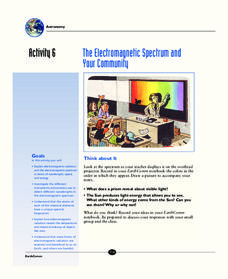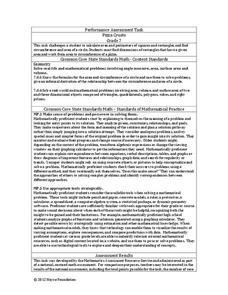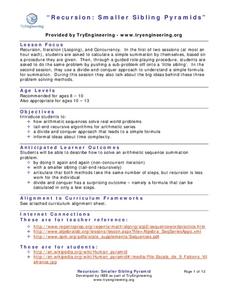English Worksheets Land
Out to Lunch
Enhance instruction and practice reading with a worksheet that doesn't just ask scholars to identify a sentence's point of view, but also poses the question, How do you know?
Keep Your Children Safe
Fleeting Happiness
Shed light onto the subject of happiness with a activity that focuses on how the emotion—much like other emotions—does not last forever. Scholars read brief passages and answer nine short-answer questions that examine their personal...
It's About Time
The Electromagnetic Spectrum and Your Community
Do you have blossoming astronomers who seek to understand the electromagnetic spectrum? Assist them with exploring electromagnetic radiation and the electromagnetic spectrum as the class conducts various activities to demonstrate...
It's About Time
Paleoclimates
How do scientists know what the Earth was like in the past? This second installment of a six-part series focuses on paleoclimates and provides an overview of how geologists determine information about past climates using fossil...
International Boys' Schools Coalition
Empathy
Putting yourself in someone else's shoes is a common phrase we hear from time to time, but do children really understand? Explore empathy with elementary schoolers using these activities. Focusing on feelings and emotions,...
Baylor College
Water in Your Body
Do you know how much water you have had in the last 24 hours? Do you know how much your body needs? In this hands-on activity, your class members will estimate how much water our bodies lose each day by filling and emptying one-liter...
Baylor College
Energy for Life (Energy from Food)
Energy comes in many forms, but how do living things get the energy they need to survive and thrive? In a simple, controlled experiment with yeast, water, and sugar, groups make observations about how yeast reacts with water alone, then...
Curated OER
The Present Subjunctive: How?
Once your class has mastered the indicative, it's time to present the subjunctive mood. This resource focuses solely on how to conjugate in the present subjunctive, but does link to more information on how to to use it. Class members can...
Palomar College
Making Yes/No Questions in the Present Tense
Does your class need some practice with writing yes or no questions in the present tense? This worksheet offers learners some choice as they pair activities with subjects to form questions. Pupils also write a quick response to each...
It's About Time
Plate Boundaries and Plate Interactions
How does the Earth continually repair itself? Explore the answer to this question, and others, with a unit on plate boundaries and interaction. Pupils classify the types of movement at plate boundaries and identify the...
NASA
Discovering Some of Your “Yardsticks” Are Actually “Meter-sticks”
The Milky Way gets great reviews on Trip Advisor — 100 million stars. The activity allows scholars to rethink their assumptions and prior knowledge. Pupils observe a set of two lights at equal distance and brightness, but they believe...
Kenan Fellows
The Effects of Environmental Conditions on Aquatic Organisms
What kind of experiment can your class do to how observe the environment effects on organisms? Groups design and conduct lab experiments to learn about the effects of the environment on aquatic organisms. Based upon knowledge gained...
Norfork School District
Habits of Mind
Why do artists create? To solve a problem, of course. Young artists work individually and then in groups to create observational, imaginative, and narrative drawings in response to an assignment that requires them to employ all 16...
Teach Engineering
Force on a Current Carrying Wire
What do electrical currents have to do with an MRI? Using a simple wire setup and a magnet, class members explore forces used in an MRI by investigating the magnetic force acting on a wire carrying a current.
Teach Engineering
Who Can Make the Best Coordinate System?
Working with a map that does not have a coordinate system on it, small, collaborative teams must come up with a coordinate system for their map. Groups then explain their coordinate structure to the class.
Noyce Foundation
Pizza Crusts
Enough stuffed crust to go around. Pupils calculate the area and perimeter of a variety of pizza shapes, including rectangular and circular. Individuals design rectangular pizzas with a given area to maximize the amount of crust and do...
Little Giraffes Teaching Ideas
Snowman Snowman
What do snowmen eat? Or smell? Read about the senses of a snowman with a cute picture book. Kindergartners cut or fold the pages to create a story about a snowman and what he sees, smells, hears, eats, and feels.
TryEngineering
Recursion: Smaller Sibling Pyramids
Get siblings to do your work. Scholars learn how to perform summations of arithmetic sequences in an innovative lesson. They use iterations, smaller siblings (tail-end recursion), and the divide-and-conquer approach.
K5 Learning
Survival in the Wild
How do animals survive in the wild? Read about the different adaptations such as camouflage and self-protection that animals use to survive.
K5 Learning
What Is A Spacewalk?
Read about all the jobs astronauts do and all the responsibilities they have while on a spacewalk. After reading the what, the why, and the how about spacewalks, readers respond to six comprehension questions.
NOAA
Please Pass the Salt
Salinity is the focus of two experimenters that work to answer the question, How does salt change the physical properties of water? Super scientists compare the freezing rate of salt and fresh water, combine the two waters to...
CK-12 Foundation
Mutually Inclusive Events: Flower Beds at the Community Garden
What color does your garden grow? Learners manipulate the number of flowers of two colors in two garden plots. They determine the probabilities of choosing a particular color of a flower in a given plot. Scholars find the relationship of...
CK-12 Foundation
Sets: Bikes or Boards?
Do people ride, slide, or do both? Pupils use an interactive Venn diagram for the numbers of people owning bicycles, owning skateboards, or both. An interactive provides questions for them to answer using the diagram.
ProCon
School Vouchers
Do school vouchers for private schools improve public school education, or do they lead to worse academic performance? Scholars read the top four pros and cons to decide if school vouchers are a good idea. They also participate in an...
Other popular searches
- Picture Does Not Belong
- Al Capone Does My Shirts
- Do and Does
- Does
- Which Word Does Not Belong
- Does Not Belong
- How Does Light Travel
- Sentence Does Not Belong
- Which Does Not Belong
- Anansi Does the Impossible
- Does Salt Evaporate
- Where Does Food Come From

























